

Influences - Context. T. S. Eliot - Wikipedia. The Elder Statesman. The Elder Statesman is a play in verse by T.
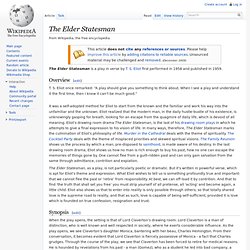
S. Eliot first performed in 1958 and published in 1959. Overview[edit] T. S. It was a self-adopted method for Eliot to start from the known and the familiar and work his way into the unfamiliar and the unknown. The Elder Statesman, as a play, is not particularly poetic or dramatic. Synopsis[edit] When the play opens, the setting is that of Lord Claverton’s drawing room. As the play progresses, we see that Gomez manages to lure away Claverton’s son Michael, according to whom his father never understood him. After his confession to Monica and her re-assurance to her father, Claverton expresses his desire to go for a walk. Objective correlative. An objective correlative is a literary term referring to a symbolic article used to provide explicit, rather than implicit, access to such traditionally inexplicable concepts as emotion or color.
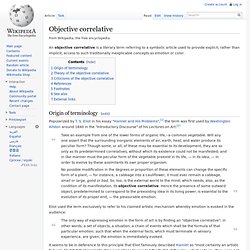
Origin of terminology[edit] The Possibility of a Poetic Drama. T.S. Eliot. 1921. The Sacred Wood; Essays on Poetry and Criticism. Gerontion - Wikipedia. "Gerontion" is a poem by T.
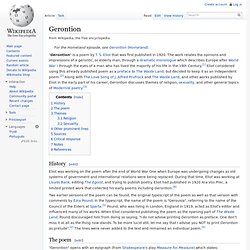
S. Eliot that was first published in 1920. The work relates the opinions and impressions of a gerontic, or elderly man, through a dramatic monologue which describes Europe after World War I through the eyes of a man who has lived the majority of his life in the 19th Century.[1] Eliot considered using this already published poem as a preface to The Waste Land, but decided to keep it as an independent poem.[2] Along with The Love Song of J. Alfred Prufrock and The Waste Land, and other works published by Eliot in the early part of his career, Gerontion discusses themes of religion, sexuality, and other general topics of Modernist poetry.[3] History[edit] Two earlier versions of the poem can be found, the original typescript of the poem as well as that version with comments by Ezra Pound.
The poem[edit] "Gerontion" opens with an epigraph (from Shakespeare's play Measure for Measure) which states: Thou hast nor youth nor age But as it were an after dinner sleep. The Love Song of J. Alfred Prufrock - Wikipedia. Composition and publication history[edit] T.S.
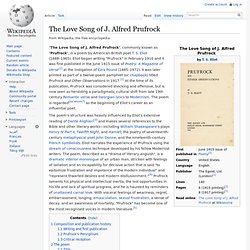
Eliot in 1923, photographed by Lady Ottoline Morrell Writing and first publication[edit] Prufrock's Pervigilium[edit] Critical reception[edit] Its reception in London can be gauged from an unsigned review in The Times Literary Supplement on 21 June 1917. The Harvard Vocarium at Harvard College recorded Eliot's reading of Prufrock and other poems in 1947, as part of their ongoing series of poetry readings by their authors.[14] On The Love Song of J. Alfred Prufrock. On "The Love Song of J.
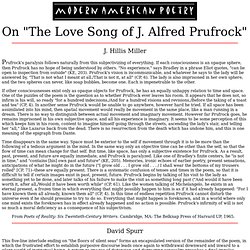
Alfred Prufrock" J. Hillis Miller Prufrock's paralysis follows naturally from this subjectivizing of everything. T.S. Eliot Reads: The Love Song of J. Alfred Prufrock. Lesson 3: Navigating Modernism with J. Alfred Prufrock. Planes, (subway) trains, automobiles and World War I—A dramatic shift in sensibilities ocurred as a result of these factors of modern life.
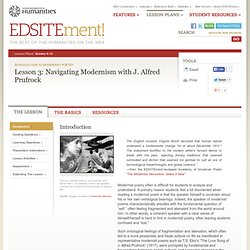
Credit: Images courtesy of American Memory The English novelist Virginia Woolf declared that human nature underwent a fundamental change "on or about December 1910. " The statement testifies to the modern writer's fervent desire to break with the past, rejecting literary traditions that seemed outmoded and diction that seemed too genteel to suit an era of technological breakthroughs and global violence.” —from the EDSITEment-reviewed Academy of American Poets “The Modernist Revolution: Make It New” Modernist poetry often is difficult for students to analyze and understand. Such ontological feelings of fragmentation and alienation, which often led to a more pessimistic and bleak outlook on life as manifested in representative modernist poems such as T.S.
The Waste Land - Wikipedia. "The Waste Land", by T.S.
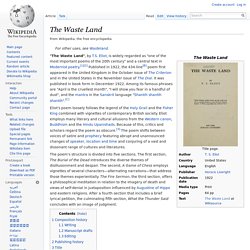
Eliot, is widely regarded as "one of the most important poems of the 20th century" and a central text in Modernist poetry.[1][2] Published in 1922, the 434-line[B] poem first appeared in the United Kingdom in the October issue of The Criterion and in the United States in the November issue of The Dial. It was published in book form in December 1922. Among its famous phrases are "April is the cruellest month", "I will show you fear in a handful of dust", and the mantra in the Sanskrit language "Shantih shantih shantih".
[C] The poem's structure is divided into five sections. The Waste Land, read by T.S Eliot (whole poem with notes) BBC Radio 4 - In Our Time, The Waste Land and Modernity. Introduction to Modernist Poetry. The English novelist Virginia Woolf declared that human nature underwent a fundamental change "on or about December 1910.
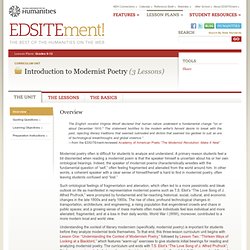
" The statement testifies to the modern writer's fervent desire to break with the past, rejecting literary traditions that seemed outmoded and diction that seemed too genteel to suit an era of technological breakthroughs and global violence.” —from the EDSITEment-reviewed Academy of American Poets “The Modernist Revolution: Make It New” Modernist poetry often is difficult for students to analyze and understand. A primary reason students feel a bit disoriented when reading a modernist poem is that the speaker himself is uncertain about his or her own ontological bearings.